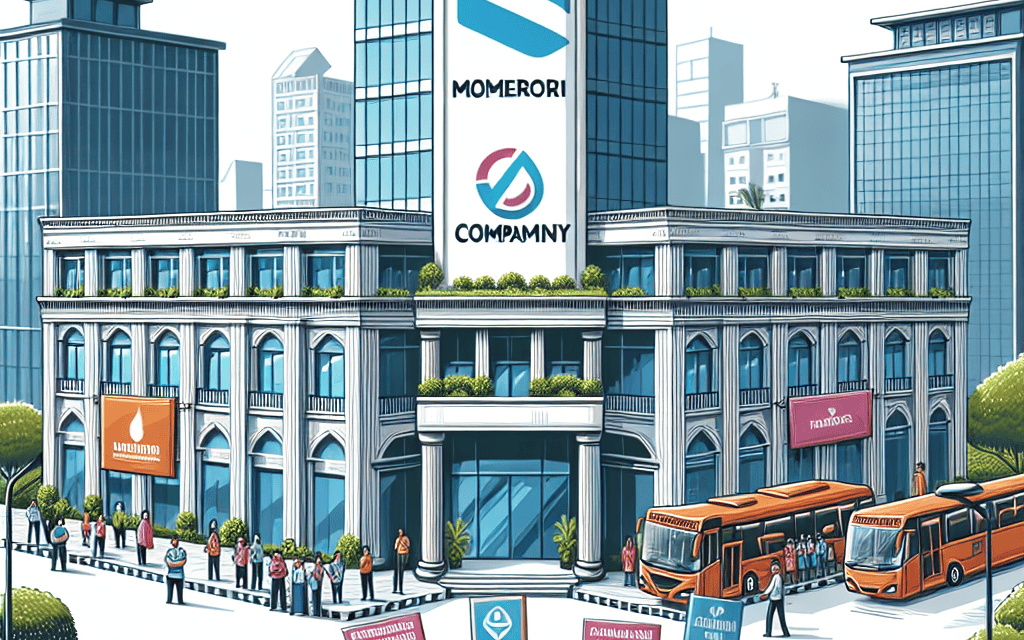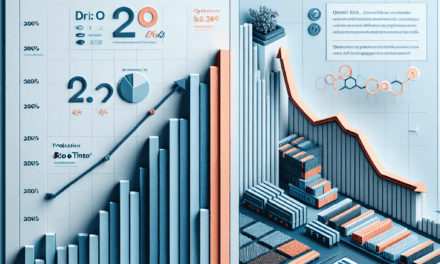“Unilever Responds: Transforming Challenges into Change in Indonesia”
Introduction
Unilever, a global leader in consumer goods, has announced significant operational changes in its Indonesian market in response to recent boycotts. These boycotts, driven by consumer dissatisfaction and socio-political factors, have prompted the company to reassess its strategies and engagement within the region. The changes aim to address the concerns raised by stakeholders and restore consumer trust while reinforcing Unilever’s commitment to sustainable and ethical business practices. This strategic shift underscores the company’s adaptability and responsiveness to market dynamics and consumer sentiment, highlighting its dedication to maintaining its reputation and market position in Indonesia.
Unilever’s Strategic Shift in Indonesia: A Response to Boycotts
Unilever, a global leader in consumer goods, has recently undertaken significant strategic changes in its operations in Indonesia, a move largely seen as a response to mounting boycotts. These boycotts, driven by a combination of environmental concerns and social issues, have prompted the company to reassess its business practices in one of its key markets. As a result, Unilever is now implementing a series of initiatives aimed at addressing the concerns of both consumers and activists, while also ensuring the sustainability of its operations in the region.
To begin with, Unilever has committed to enhancing its environmental stewardship in Indonesia, a country that is home to some of the world’s most biodiverse ecosystems. The company has announced plans to significantly reduce its carbon footprint by transitioning to renewable energy sources for its manufacturing facilities. This shift is expected to not only lower greenhouse gas emissions but also set a precedent for other multinational corporations operating in the region. Furthermore, Unilever is investing in sustainable sourcing practices, particularly in the procurement of palm oil, a key ingredient in many of its products. By collaborating with local farmers and NGOs, the company aims to promote deforestation-free supply chains, thereby addressing one of the primary environmental concerns associated with its operations.
In addition to environmental initiatives, Unilever is also focusing on social responsibility as part of its strategic shift. Recognizing the importance of community engagement, the company has launched several programs aimed at improving the livelihoods of local communities. These initiatives include providing education and training opportunities for workers, as well as supporting small and medium-sized enterprises through microfinance schemes. By empowering local communities, Unilever hopes to foster a more inclusive and equitable business environment, which in turn could help mitigate some of the social issues that have fueled the boycotts.
Moreover, Unilever is taking steps to enhance transparency and accountability in its operations. The company has pledged to increase the frequency and detail of its sustainability reports, providing stakeholders with greater insight into its progress and challenges. This move is intended to build trust with consumers and activists alike, demonstrating Unilever’s commitment to responsible business practices. Additionally, the company is strengthening its partnerships with local governments and civil society organizations, seeking to create a collaborative approach to addressing the complex issues it faces in Indonesia.
While these changes represent a significant shift in Unilever’s strategy, they also highlight the growing influence of consumer activism in shaping corporate behavior. The boycotts in Indonesia have underscored the power of collective action in holding companies accountable for their environmental and social impacts. In response, Unilever’s initiatives reflect a broader trend among multinational corporations to prioritize sustainability and social responsibility as integral components of their business models.
In conclusion, Unilever’s strategic shift in Indonesia serves as a testament to the company’s adaptability and responsiveness to external pressures. By implementing major changes in response to boycotts, Unilever is not only addressing immediate concerns but also laying the groundwork for long-term sustainability and success in the region. As the company continues to navigate the complexities of operating in a diverse and dynamic market, its efforts in Indonesia may well serve as a blueprint for other corporations facing similar challenges worldwide.
Impact of Consumer Boycotts on Unilever’s Indonesian Market
Unilever, a global leader in consumer goods, has recently undertaken significant changes in its operations in Indonesia, a move largely attributed to the impact of consumer boycotts. These boycotts, which have gained momentum over the past few years, have compelled the company to reassess its strategies and align more closely with the evolving expectations of Indonesian consumers. The changes implemented by Unilever are not only a response to immediate pressures but also a strategic pivot aimed at ensuring long-term sustainability and market relevance in one of Southeast Asia’s largest economies.
The consumer boycotts in Indonesia were primarily driven by growing concerns over environmental sustainability and ethical business practices. As consumers become increasingly aware of the environmental impact of their purchasing decisions, they have begun to demand more transparency and accountability from corporations. Unilever, with its extensive portfolio of household brands, found itself at the center of this consumer activism. The boycotts highlighted the need for the company to address issues such as plastic waste, carbon emissions, and fair labor practices, which have become critical factors influencing consumer loyalty and brand perception.
In response to these challenges, Unilever has embarked on a comprehensive transformation of its Indonesian operations. One of the most notable changes is the company’s commitment to reducing plastic waste. Unilever has pledged to halve its use of virgin plastic by 2025 and has introduced innovative packaging solutions to meet this target. By investing in biodegradable materials and promoting the use of recycled plastics, Unilever aims to significantly reduce its environmental footprint. This initiative not only addresses consumer concerns but also positions the company as a leader in sustainable business practices within the region.
Moreover, Unilever has intensified its efforts to ensure ethical sourcing and fair labor practices across its supply chain. Recognizing the importance of social responsibility, the company has implemented stricter guidelines and monitoring systems to ensure that its suppliers adhere to ethical standards. This move is designed to foster trust and credibility among consumers who are increasingly scrutinizing the origins of the products they purchase. By prioritizing ethical sourcing, Unilever is not only mitigating the risk of future boycotts but also enhancing its brand image as a socially responsible corporation.
In addition to these environmental and ethical initiatives, Unilever has also focused on strengthening its engagement with local communities. The company has launched several community development programs aimed at improving livelihoods and promoting sustainable practices at the grassroots level. By investing in education, health, and entrepreneurship, Unilever is working to build a more resilient and inclusive ecosystem that benefits both the company and the communities it serves. This approach not only addresses the root causes of consumer dissatisfaction but also reinforces Unilever’s commitment to contributing positively to Indonesian society.
The impact of these changes on Unilever’s Indonesian market is already becoming evident. By aligning its operations with consumer values and expectations, the company is regaining trust and loyalty among its customer base. Furthermore, these initiatives have positioned Unilever as a forward-thinking leader in the industry, setting a benchmark for other corporations operating in the region. As the company continues to navigate the complexities of the Indonesian market, it remains clear that the lessons learned from the boycotts have been instrumental in shaping a more sustainable and responsible business model. Through these efforts, Unilever is not only addressing immediate challenges but also laying the foundation for long-term success in Indonesia.
Unilever’s New Policies in Indonesia: What Consumers Need to Know
Unilever, a global leader in consumer goods, has recently announced significant policy changes in Indonesia, a move that comes in the wake of widespread boycotts. These boycotts were primarily driven by consumer dissatisfaction with the company’s environmental practices and its perceived lack of social responsibility. As a result, Unilever has taken decisive steps to address these concerns, aiming to rebuild trust and strengthen its market position in the region.
To begin with, Unilever has committed to enhancing its sustainability efforts in Indonesia. This commitment is evident in the company’s pledge to reduce its carbon footprint by transitioning to renewable energy sources for its manufacturing processes. By 2025, Unilever aims to power all its Indonesian facilities with 100% renewable energy, a goal that aligns with its broader global sustainability targets. This shift not only demonstrates Unilever’s dedication to environmental stewardship but also sets a precedent for other multinational corporations operating in the region.
In addition to its environmental initiatives, Unilever is also focusing on improving its supply chain transparency. The company has introduced a new policy that requires all suppliers to adhere to strict environmental and ethical standards. This policy is designed to ensure that all raw materials are sourced responsibly, thereby minimizing the environmental impact of its products. Furthermore, Unilever has committed to working closely with local communities and NGOs to monitor compliance and promote sustainable practices throughout its supply chain.
Moreover, Unilever is taking steps to address social issues that have been at the forefront of consumer concerns. The company has launched several community development programs aimed at improving the livelihoods of local farmers and workers. These programs include providing training and resources to help smallholder farmers adopt sustainable agricultural practices, thereby increasing their productivity and income. Additionally, Unilever is investing in education and healthcare initiatives to support the well-being of communities in which it operates.
To further demonstrate its commitment to social responsibility, Unilever has also revised its marketing strategies in Indonesia. The company is now prioritizing the promotion of products that are not only environmentally friendly but also culturally relevant. By doing so, Unilever hopes to resonate more deeply with Indonesian consumers and foster a sense of brand loyalty. This approach is complemented by the company’s efforts to engage with consumers through digital platforms, allowing for more direct and meaningful interactions.
Unilever’s policy changes in Indonesia are a testament to the company’s recognition of the evolving expectations of consumers. By addressing environmental and social concerns, Unilever is not only responding to the immediate challenges posed by the boycotts but also positioning itself for long-term success in the region. These initiatives reflect a broader trend among multinational corporations to prioritize sustainability and social responsibility as integral components of their business strategies.
In conclusion, Unilever’s new policies in Indonesia represent a significant shift in the company’s approach to doing business in the region. By focusing on sustainability, supply chain transparency, and social responsibility, Unilever is taking proactive steps to rebuild consumer trust and ensure its continued success. As these changes take effect, consumers in Indonesia can expect to see a more responsible and engaged Unilever, committed to making a positive impact on both the environment and society.
How Boycotts Are Reshaping Unilever’s Business Strategy in Indonesia

Unilever, a global leader in consumer goods, has recently undertaken significant strategic changes in its Indonesian operations in response to a series of boycotts. These boycotts, driven by consumer dissatisfaction and heightened awareness of corporate responsibility, have prompted Unilever to reassess its business practices and align more closely with the evolving expectations of its stakeholders. As a result, the company is now navigating a complex landscape where consumer sentiment and corporate accountability are increasingly intertwined.
The catalyst for these changes can be traced back to a growing movement among Indonesian consumers who have become more vocal about their demands for ethical business practices. This movement gained momentum through social media platforms, where consumers organized and amplified their calls for boycotts against companies perceived as falling short in areas such as environmental sustainability, labor rights, and social justice. Unilever, with its extensive portfolio of household brands, found itself at the center of this scrutiny. Consequently, the company recognized the urgent need to address these concerns to maintain its market position and reputation.
In response, Unilever has embarked on a comprehensive strategy to realign its operations in Indonesia with the principles of sustainability and social responsibility. One of the key initiatives involves a commitment to reducing the environmental impact of its products. This includes efforts to minimize plastic waste by increasing the use of recycled materials in packaging and investing in innovative solutions to promote a circular economy. By doing so, Unilever aims to not only meet consumer expectations but also contribute to broader environmental goals.
Moreover, Unilever is placing a renewed emphasis on ethical labor practices within its supply chain. Recognizing the importance of fair labor conditions, the company is working closely with local suppliers to ensure compliance with international labor standards. This involves regular audits and the implementation of training programs to empower workers and improve working conditions. By fostering a more equitable supply chain, Unilever seeks to build trust with consumers who are increasingly concerned about the origins of the products they purchase.
In addition to environmental and labor initiatives, Unilever is also focusing on community engagement as a cornerstone of its revised strategy. The company is investing in local communities through various social programs aimed at improving education, health, and economic opportunities. By actively participating in community development, Unilever is not only addressing the immediate needs of its stakeholders but also strengthening its long-term relationship with the Indonesian market.
These strategic changes are indicative of a broader shift within Unilever as it adapts to the changing dynamics of consumer behavior and corporate responsibility. The company recognizes that in order to thrive in today’s market, it must go beyond traditional business models and embrace a more holistic approach that considers the social and environmental impact of its operations. This transformation is not without its challenges, as it requires significant investment and a willingness to innovate. However, Unilever is confident that these efforts will ultimately lead to a more sustainable and resilient business.
In conclusion, the boycotts in Indonesia have served as a catalyst for Unilever to reevaluate and enhance its business strategy. By prioritizing sustainability, ethical labor practices, and community engagement, the company is positioning itself to meet the demands of a more conscientious consumer base. As Unilever continues to implement these changes, it sets a precedent for other corporations facing similar pressures, demonstrating that aligning business practices with societal values is not only a moral imperative but also a strategic necessity in today’s global marketplace.
Unilever’s Commitment to Change: Addressing Boycott Concerns in Indonesia
Unilever, a global leader in consumer goods, has recently announced significant changes in its operations in Indonesia, a move prompted by widespread boycotts and growing consumer concerns. These boycotts, which have gained momentum over the past year, were primarily driven by environmental and social issues, compelling the company to reassess its strategies and policies in the region. As a result, Unilever has embarked on a comprehensive plan to address these concerns, demonstrating its commitment to sustainable and ethical business practices.
To begin with, Unilever has pledged to enhance its environmental sustainability efforts in Indonesia. Recognizing the critical role that palm oil plays in its supply chain, the company has committed to sourcing 100% of its palm oil from certified sustainable sources by 2025. This initiative is part of a broader strategy to reduce deforestation and promote biodiversity. By collaborating with local farmers and organizations, Unilever aims to implement more sustainable agricultural practices, thereby minimizing the environmental impact of its operations. Furthermore, the company has invested in reforestation projects and conservation programs, underscoring its dedication to preserving Indonesia’s rich natural heritage.
In addition to environmental initiatives, Unilever is also focusing on improving social conditions within its Indonesian operations. The company has introduced a series of measures aimed at enhancing labor rights and ensuring fair treatment of workers. These measures include the implementation of stricter labor standards, regular audits, and the establishment of grievance mechanisms to address worker concerns. By fostering a more equitable and transparent work environment, Unilever seeks to build trust and strengthen its relationship with local communities.
Moreover, Unilever is actively engaging with stakeholders to foster dialogue and collaboration. The company has initiated partnerships with non-governmental organizations, local communities, and government agencies to address the root causes of the boycotts. Through these collaborations, Unilever aims to develop innovative solutions that align with the interests of all parties involved. This approach not only helps in addressing immediate concerns but also contributes to long-term sustainable development in the region.
Unilever’s commitment to change is further reflected in its efforts to enhance transparency and accountability. The company has introduced a comprehensive reporting system to track progress on its sustainability goals and share updates with stakeholders. By providing regular reports and updates, Unilever aims to maintain open communication and demonstrate its dedication to continuous improvement. This transparency is crucial in rebuilding consumer trust and ensuring that the company’s actions align with its stated commitments.
In conclusion, Unilever’s response to the boycotts in Indonesia highlights its commitment to addressing environmental and social concerns. Through a combination of sustainable sourcing, improved labor practices, stakeholder engagement, and enhanced transparency, the company is taking significant steps to align its operations with the expectations of consumers and communities. While challenges remain, Unilever’s proactive approach serves as a testament to its dedication to creating a positive impact in Indonesia. As the company continues to implement these changes, it sets a precedent for other multinational corporations to follow, emphasizing the importance of responsible business practices in today’s globalized world.
The Role of Social Media in Unilever’s Indonesian Boycott Response
In recent years, the influence of social media on corporate behavior has become increasingly evident, with companies often finding themselves under intense scrutiny from the public. Unilever, a global consumer goods giant, has experienced this firsthand in Indonesia, where it faced significant boycotts. These boycotts were largely driven by social media campaigns that highlighted various concerns about the company’s practices. In response, Unilever has implemented major changes in its operations within the country, demonstrating the powerful role that social media can play in shaping corporate strategies.
Initially, the boycotts against Unilever in Indonesia were sparked by allegations related to environmental and social issues. Activists and concerned consumers took to platforms such as Twitter, Facebook, and Instagram to voice their discontent, using hashtags and viral posts to amplify their message. The rapid dissemination of information on these platforms allowed the movement to gain momentum quickly, reaching a wide audience and putting pressure on Unilever to address the concerns raised. As the situation escalated, it became clear that the company could not afford to ignore the growing public outcry.
Recognizing the potential impact on its brand reputation and sales, Unilever took decisive action to address the issues highlighted by the boycotts. The company announced a series of changes aimed at improving its environmental and social footprint in Indonesia. These changes included commitments to reduce plastic waste, enhance supply chain transparency, and invest in community development projects. By publicly outlining these initiatives, Unilever sought to demonstrate its responsiveness to consumer demands and its willingness to adapt its practices in line with societal expectations.
The role of social media in this scenario cannot be overstated. It served as both a catalyst for the boycotts and a platform for Unilever to communicate its response. The company utilized its own social media channels to engage with consumers directly, providing updates on the progress of its initiatives and addressing concerns in real-time. This approach not only helped to rebuild trust with its audience but also showcased Unilever’s commitment to transparency and accountability.
Moreover, the situation in Indonesia highlights a broader trend in the corporate world, where companies are increasingly held accountable by the public through social media. Consumers today are more informed and empowered than ever before, with the ability to influence corporate behavior through collective action. This shift has prompted many companies to adopt more sustainable and ethical practices, recognizing that their long-term success is closely tied to their social and environmental impact.
In conclusion, the case of Unilever in Indonesia underscores the significant role that social media plays in shaping corporate responses to public pressure. The company’s decision to implement major changes following the boycotts demonstrates the power of social media as a tool for advocacy and accountability. As consumers continue to leverage these platforms to voice their concerns, companies must remain vigilant and responsive, ensuring that their practices align with the values and expectations of their audience. Ultimately, this dynamic interaction between corporations and consumers has the potential to drive positive change, fostering a more sustainable and equitable business landscape.
Unilever’s Sustainability Initiatives in Indonesia Post-Boycott
In recent years, Unilever has faced significant challenges in Indonesia, a key market for the multinational consumer goods company. The company, known for its wide range of products from food and beverages to cleaning agents and personal care items, encountered a wave of boycotts driven by growing consumer awareness and activism around environmental and social issues. These boycotts, fueled by concerns over deforestation, palm oil sourcing, and labor practices, prompted Unilever to reevaluate its operations and sustainability initiatives in the region. In response, Unilever has implemented a series of major changes aimed at addressing these concerns and rebuilding trust with Indonesian consumers.
To begin with, Unilever has committed to enhancing the transparency of its supply chain, particularly concerning palm oil, a critical ingredient in many of its products. Recognizing the environmental impact of palm oil production, which has been linked to deforestation and habitat destruction, Unilever has pledged to source 100% of its palm oil from certified sustainable sources. This commitment is part of a broader strategy to ensure that all raw materials are sustainably sourced, thereby minimizing the company’s ecological footprint. By collaborating with local farmers and suppliers, Unilever aims to promote sustainable agricultural practices that protect biodiversity and support local communities.
Moreover, Unilever has introduced innovative programs to improve the livelihoods of smallholder farmers in Indonesia. These programs focus on providing training and resources to help farmers adopt sustainable farming techniques, increase crop yields, and improve their overall economic well-being. By investing in the development of local communities, Unilever not only addresses the root causes of environmental degradation but also fosters economic resilience and social equity. This approach aligns with the company’s global commitment to enhancing the livelihoods of millions of people across its value chain.
In addition to these efforts, Unilever has taken significant steps to reduce its carbon emissions and water usage in Indonesia. The company has set ambitious targets to achieve net-zero emissions from its operations by 2039 and to halve the environmental impact of its products by 2030. To achieve these goals, Unilever is investing in renewable energy sources, improving energy efficiency in its manufacturing processes, and implementing water conservation measures. These initiatives are designed to mitigate the effects of climate change and ensure the long-term sustainability of Unilever’s operations in Indonesia.
Furthermore, Unilever has strengthened its commitment to social responsibility by enhancing labor practices and ensuring fair treatment of workers throughout its supply chain. The company has implemented rigorous standards to prevent child labor, forced labor, and discrimination, while also promoting safe and healthy working conditions. By upholding these standards, Unilever seeks to create a more equitable and just working environment for all employees and partners in Indonesia.
In conclusion, Unilever’s response to the boycotts in Indonesia reflects a comprehensive approach to sustainability that addresses environmental, social, and economic challenges. By prioritizing transparency, sustainable sourcing, community development, and responsible business practices, Unilever is working to rebuild consumer trust and ensure the long-term success of its operations in the region. As the company continues to implement these changes, it sets a precedent for other multinational corporations operating in Indonesia and beyond, demonstrating that sustainable business practices are not only possible but essential for future growth and prosperity.
Q&A
1. **What prompted Unilever to implement changes in Indonesia?**
Unilever implemented changes in response to consumer boycotts in Indonesia.
2. **What were the main reasons for the boycotts against Unilever in Indonesia?**
The boycotts were primarily due to consumer dissatisfaction with Unilever’s business practices or product offerings, which may have included concerns over environmental impact, cultural sensitivity, or pricing.
3. **What specific changes did Unilever make in response to the boycotts?**
Unilever made changes that could include altering product formulations, improving sustainability practices, adjusting marketing strategies, or engaging more with local communities.
4. **How did Unilever address environmental concerns in Indonesia?**
Unilever may have enhanced its sustainability initiatives, such as reducing plastic usage, improving waste management, or sourcing materials more responsibly.
5. **What impact did the boycotts have on Unilever’s sales in Indonesia?**
The boycotts likely led to a noticeable decline in sales, prompting the company to take corrective actions to regain consumer trust and market share.
6. **How did Unilever engage with local communities following the boycotts?**
Unilever might have increased its community engagement efforts through partnerships, local investments, or corporate social responsibility programs to rebuild its reputation.
7. **What long-term strategies did Unilever implement to prevent future boycotts in Indonesia?**
Unilever likely developed long-term strategies focusing on transparency, cultural sensitivity, continuous dialogue with stakeholders, and ongoing improvements in sustainability and ethical practices.
Conclusion
Unilever’s decision to implement major changes in Indonesia following boycotts highlights the company’s responsiveness to consumer sentiment and socio-political pressures. The boycotts likely stemmed from public dissatisfaction with certain practices or policies, prompting Unilever to reassess and modify its operations to align better with local expectations and values. This move not only aims to restore consumer trust and brand reputation but also underscores the importance of corporate adaptability in a global market. By addressing the root causes of the boycotts, Unilever demonstrates a commitment to ethical practices and sustainable growth, which could strengthen its market position in Indonesia and serve as a model for handling similar challenges in other regions.





